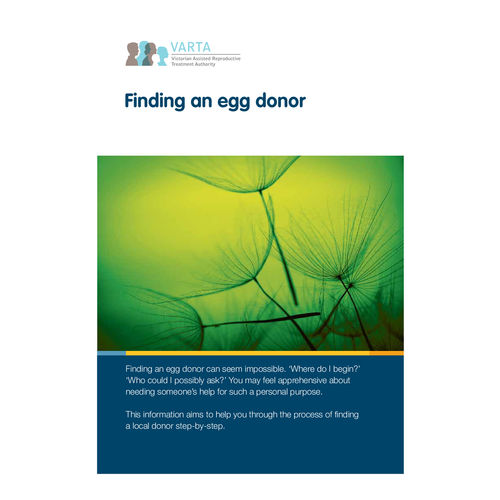Using donor sperm or eggs
Some couples or individuals will require the use of donated eggs, sperm or embryos to create a family.
This decision to create a family using donor gametes (eggs or sperm) or embryos will have a significant impact on everyone involved, including those who donate. The dedicated Melbourne IVF donor team provides guidance and support throughout the entire process, helping donors and recipients make considered and informed decisions.
Victorian donation laws
All donor procedures in Victoria are regulated by the Assisted Reproductive Treatment Act 2008. Under this Act treatment from one donor may result in only ten women having children who are genetic siblings. This includes children the donor has had with their current and former partners. Donors may choose to donate to fewer than 10 women.
It is an offence under the Assisted Reproductive Treatment Act 2008 to intentionally receive or offer to receive payment for donation other than travel and medical expenses actually incurred.
Changes to the assisted reproductive treatment act
Since 2015 there have been various changes to the Assisted Reproductive Treatment (ART) Act (2008) regarding donors and donor-conceived offspring.
In February 2016, the Victorian government passed an amendment to the ;ART Act (2008) allowing donor-conceived Victorians from egg, sperm or embryo donation access to identifying information about their donors without the donor’s consent no matter when the donation took place. This change will take effect from 1st March 2017.
This change will allow donor conceived Victorians the right to knowledge about their genetic origin which may contribute to their sense of identity as well as allow the exchange of medical information and provide for future family planning.
In June 2015, changes to the Victorian ART Act allowed for the provision of access to information about donors for persons born from donations made prior to 1 July 1988. This change enabled access for people conceived from gametes or embryos donated prior 1st July 1988 to identifying information about donors where available and with the consent of the donors.
Allowing donor conceived offspring access to information and/or contact as well as allowing donors to have a say about if or how this occurs, is a balanced way of meeting donors and donor-conceived offsprings’ needs. Melbourne IVF has by request linked donor conceived offspring with donors and the vast majority of our donors have agreed to contact or the provision of information in some form and have reported very positive outcomes as a result.
How will this impact me?
If you donated at Melbourne IVF prior to 1988 or are a recipient or a donor conceived offspring of a donor who donated prior to 1988 and would like to understand more how this change in law will impact you, you can contact the Melbourne IVF counselling team on (03) 9473 4418 or the Victorian Assisted Reproductive Treatment Association (VARTA) on (03) 8601 5250.
Allowing exchange of medical information
The change to this section of the bill is to provide a mechanism to enable medical information to be disclosed between donors and their offspring and between the donor conceived siblings if it is necessary to save a person’s life or to warn about a genetic or hereditary condition that may be harmful.
Whilst Melbourne IVF has already helped some patients to disclose medical information, there is no mechanism in the Act 2008 Act for disclosure of medical information.
Prior to disclosure, a doctor needs to certify in writing that disclosure is necessary to (a) save a person’s life or to (b) warn the person about the existence of a genetic or hereditary condition that may be harmful to that person or that person’s descendants.
For the purposes of disclosing medical information, an ART provider can make a request of BDM and BDM can disclose identifying information to an ART provider in relation to a donor, donor conceived person or parent.
ART providers can only disclose non identifying medical information. The disclosure must be made by a doctor on behalf of an ART provider – disclosure can also extend to a person’s doctor.
Information can be disclosed without the consent of the person to whom the information relates
Importantly, ART providers are not required to disclose medical information.
Expanding counselling and donor linking
The Bill seeks to provide for increased counselling and donor-linking services (an intermediary service in the exchange of information and contact between donor conception stakeholders).
Currently, VARTA manages the donor registers whilst donor linkage counselling is managed by Family Information Networks and Discovery (FIND). The legislation currently does not allow for sharing of information between VARTA and FIND to facilitate the support and preparation of parties for linking. The change in the Bill will see the exchange of information between VARTA and the counsellor to assist with the effectiveness of the counselling sessions.
VARTA will still manage the donor registers and will continue to manage education and registration of ART clinics and other functions under the ART Act, but will also have an increased role in counselling to a wide array of donor conception stakeholders. This means VARTA will act as an intermediary in the exchange of information and contact between donor conception stakeholders.
Determining applications for advertisements of donor eggs
This last change to the Bill will allow VARTA the responsibility to review and decide applications relating to advertising for egg donors under the Human Tissue Act 1982.
It is has always been a legal requirement that prior to advertising for an egg donor to have the advertisement officially approved by the Minister for Health. VARTA is now responsible for this approval. A brochure on finding an egg donor has been developed to help recipients feel more confident in finding a local egg donor with a step-by-step guide and a list of questions to discuss with their donor, you can download this below.
Find out More
For further information about this topic, please contact Jenneke Scott, Melbourne IVF Intake Counsellor on (03) 9473 4444
Read more about the legislative changes on the VARTA website
Find out more about the Donor Conception: from anonymity to openness exhibition
Rights for donor-conceived individuals
The identity of the de-identified donors is not known to the recipient but under current Victorian legislation, the donor must give explicit consent to providing identifying information to VARTA.
When the child is aged 18 they will be able to access this information, or in some circumstances under 18, if the parent(s) consent to this or a counsellor who has provided counselling to the donor conceived child advises the registrar in writing that the child is sufficiently mature to understand the consequences of disclosure.
For more information about the registrars please visit VARTA.
What does treatment involve?
Becoming a recipient of donor sperm involves attending a series of pre-treatment appointments with a Melbourne IVF fertility specialist, counsellor, nurse and Patient Liaison Administrator, to understand and discuss all of the procedures and processes involved.
In Victoria, it is a legislative requirement that recipients and their partners (if appropriate) meet with a counsellor at least twice to discuss the implications of sperm donation and to sign consent forms. Recipients of clinic recruited donor sperm will select a donor after counselling consents are signed. Prior to commencing treatment, recipients of donor sperm will meet with a Patient Liaison Administrator to discuss management and treatment fees, and a member of the nursing team to understand the medications involved and treatment cycle timeline.
Treatment options using donor sperm
Treatment with donor sperm may be by intrauterine insemination (IUI) or in vitro fertilisation (IVF), depending on your circumstances, the quality and amount of sperm available for use, and any previous treatments. All IVF cycles using clinic-recruited donor sperm involve the use of ICSI (intracytoplasmic sperm injection).


